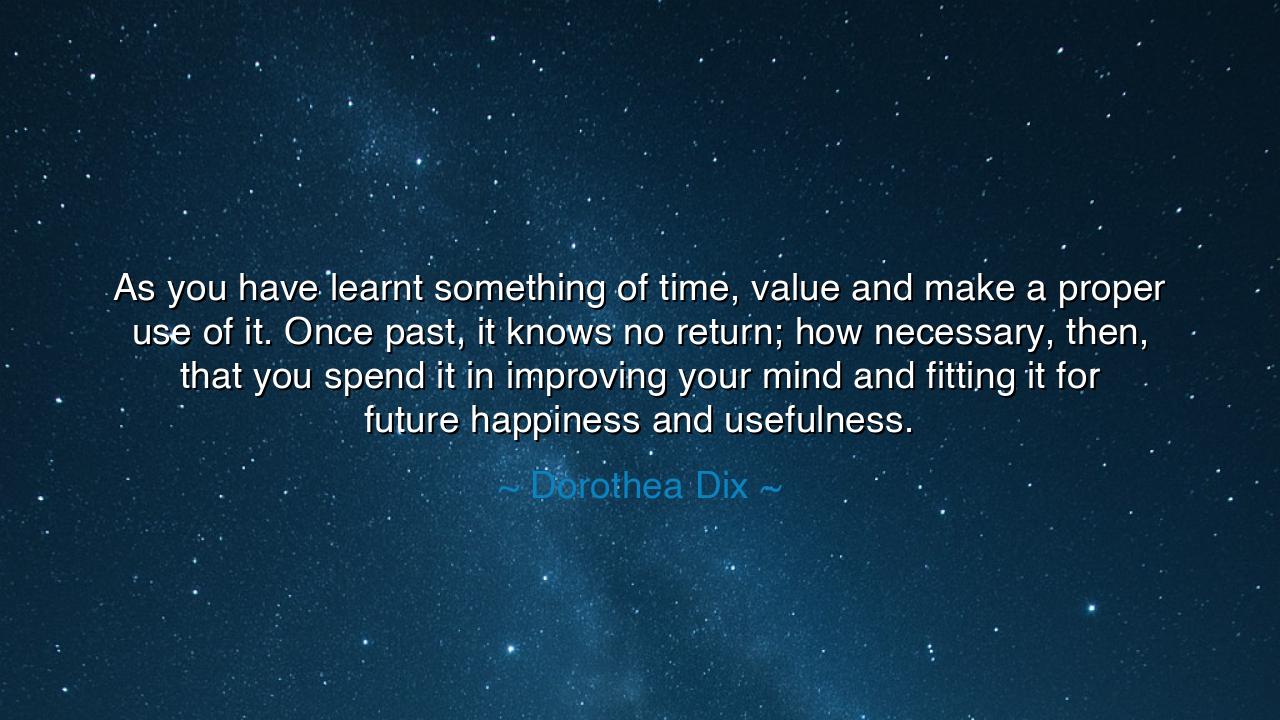
As you have learnt something of time, value and make a proper use
As you have learnt something of time, value and make a proper use of it. Once past, it knows no return; how necessary, then, that you spend it in improving your mind and fitting it for future happiness and usefulness.






"As you have learnt something of time, value and make a proper use of it. Once past, it knows no return; how necessary, then, that you spend it in improving your mind and fitting it for future happiness and usefulness." These powerful words by Dorothea Dix serve as a reminder of the precious, fleeting nature of time—the most irreplaceable of resources. Dix implores us to understand the value of time, not just as a measure of moments, but as the foundation of growth and fulfillment. Time, once lost, cannot be regained, and so it becomes essential that we use it not in idle pursuits, but in endeavors that will improve our minds, prepare us for a meaningful future, and lead us toward happiness and usefulness to others. The crux of her message lies in the recognition that every moment offers a choice: to waste it or to invest it in our personal development and in service to the greater good.
The ancients were no strangers to the importance of time. The Stoic philosophers, such as Seneca and Marcus Aurelius, wrote extensively about the brevity of life and the necessity of making the most of the time we have. Seneca, in his essay On the Shortness of Life, reminds us that life is long if we know how to use it, but it is short if we squander it. He warns that time is often wasted in distractions, in chasing after fleeting pleasures, or in worrying about things beyond our control. For the Stoics, time was a moral resource, something to be valued above all else. They understood that true happiness and usefulness came not from accumulation or external success, but from the cultivation of the mind and the pursuit of virtue.
Consider the story of Socrates, whose life exemplified the value of time spent in self-improvement and the pursuit of wisdom. Socrates spent his days not in idle luxury, but in engaging with his fellow Athenians, questioning their assumptions and seeking truth. He dedicated his life to the improvement of his mind and the development of his moral character, and in doing so, he laid the foundations for Western philosophy. The time Socrates spent in reflection, dialogue, and inquiry was not just for his own benefit; it was an investment in the future, as his teachings continue to resonate with and shape generations long after his death. His life is a testament to the power of using time wisely, for personal growth and for the greater good.
In the more recent past, Benjamin Franklin offers another example of the value of time and its proper use. Franklin famously said, "Lost time is never found again." As a young man, he developed a daily schedule to manage his time, making room for study, self-improvement, and service to society. Franklin’s dedication to using his time for learning and personal growth allowed him to become a man of great intellectual breadth and practical wisdom. His life is a model of how to seize every moment, not just for personal gain, but to contribute to the advancement of society. Franklin’s example shows us that time, properly spent, can lead to happiness and usefulness, fulfilling both personal aspirations and the needs of others.
Dix’s wisdom is timeless: time is a treasure, but one that is easily squandered if not recognized and valued. It is only in the proper use of time that we can truly grow and prepare ourselves for a future that is rich in both personal fulfillment and service to others. This is the lesson we must carry forward—time is not merely a measure of moments, but a vehicle for becoming. By investing our time in self-improvement, in learning, and in the pursuit of usefulness, we are preparing ourselves for a future that is meaningful and impactful.
The lesson Dix offers us is clear: we must honor time by spending it wisely, focusing on the growth of our minds and the cultivation of our character. In our own lives, this means prioritizing actions that lead to personal growth—whether through reading, reflecting, or taking action toward helping others. We must be diligent in avoiding distractions and the empty pursuits that consume time without yielding lasting rewards. Whether in our work, education, or relationships, we must approach time as a precious resource that cannot be wasted, but must be carefully nurtured and invested.
Let us take Dix’s wisdom to heart as we navigate our own lives. As we seek to grow, to learn, and to contribute to the world around us, we must remember that time is the most valuable gift we possess. By spending it wisely, on endeavors that enrich our minds, hearts, and communities, we honor the fleeting nature of life and prepare ourselves for a future that is filled with purpose, happiness, and usefulness. Time, once gone, cannot return—but how we spend it can shape the future for ourselves and those who come after us.






AAdministratorAdministrator
Welcome, honored guests. Please leave a comment, we will respond soon